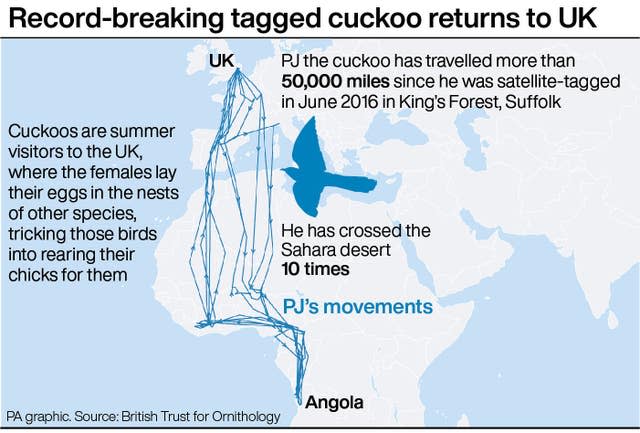Record-breaking satellite-tagged cuckoo returns to the UK
A cuckoo who is part of a project to track the fortunes of the declining bird species has returned to the UK having clocked up record mileage, conservationists said.
PJ has completed his fifth annual migration cycle to, from and within Africa since being fitted with a satellite tag in June 2016 in King’s Forest, Suffolk, returning to the UK this spring.
He has travelled more than 50,000 miles since he was tagged, and is the first satellite-tagged cuckoo to achieve the milestone since the project by the British Trust for Ornithology (BTO) began in 2011.

He has crossed the Sahara desert 10 times, as well as making sea crossings and navigating the Atlas Mountains in Morocco and the Pyrenees in France and Spain, the trust said.
The charity said PJ was a year old when he was tagged and will be six this summer, taking him to within a year of the British longevity record for a ringed cuckoo, of six years and 11 months, for a bird found dead in 1983.
Cuckoos are summer visitors to the UK, where the females lay their eggs in the nests of other species, tricking those birds into rearing their chicks for them.
The tracking project is being carried out to help uncover what might be driving declines in populations of cuckoos, which are “red listed” for conservation concern due to falling numbers, with plans to tag 12 more this spring.
Breeding cuckoo numbers are down more than two-thirds across the UK and nearly three-quarters in England in the past 23 years, the BTO said.

Dr Chris Hewson, lead scientist on the project at the BTO, said: “We have been avidly watching PJ since he began his journey back to the UK in late February, willing him to complete the journey back to the UK this spring.
“We can now heave a huge sigh of relief knowing he is safely back in Suffolk but of course, more than that, I look forward to looking more closely at the information he has given us.
“He is an amazing and unusual cuckoo – they normally migrate to Africa via either Spain or Italy and keep to the same route every year, but PJ has used both routes, and one in between, over the five years and in fact last autumn he stopped in both Spain and Italy.”
Dr Hewson suggested the flexibility may have helped him survive by allowing him to escape bad conditions on one route.
Satellite-tagged cuckoos can be tracked in near real-time on the BTO website bto.org/cuckoos.

 Yahoo News
Yahoo News 
